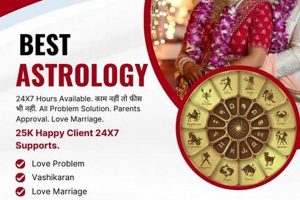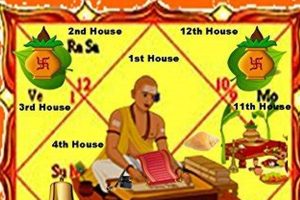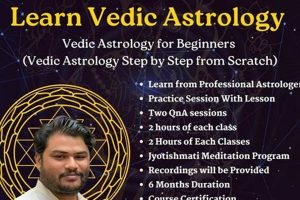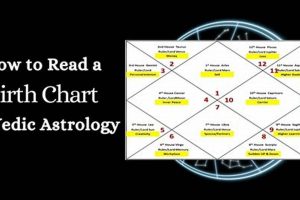A practitioner within this field combines a personal name with the descriptive terms “Vedic” and “astrologer.” “Vedic” signifies a connection to the ancient Indian scriptures known as the Vedas, which form the basis of Vedic astrology, also known as Jyotish. This system of astrology utilizes planetary positions and constellations to interpret celestial influences on human affairs and provide guidance on various life aspects.
Individuals seek guidance from such practitioners for insights into relationships, career choices, financial matters, and overall well-being. The tradition of Vedic astrology holds a significant place in Indian culture and continues to be consulted by people seeking to understand their destinies and make informed decisions. The practice dates back millennia, with its roots intertwined with the development of astronomy and philosophy in ancient India. It offers a framework for self-discovery and decision-making based on cosmic alignments and individual birth charts.
Further exploration of this topic will delve into the core principles of Vedic astrology, its methodologies, and its application in contemporary life. This includes examining the role of planetary influences, the significance of birth charts, and the ethical considerations surrounding the practice.
Vedic astrology offers valuable insights that can be applied to various life aspects. These tips provide practical guidance based on the principles of Jyotish.
Tip 1: Understand Your Birth Chart: A birth chart, or Kundali, is a personalized cosmic map based on the exact time, date, and place of birth. Consulting a qualified practitioner can help unlock its deeper meaning, revealing strengths, challenges, and karmic patterns.
Tip 2: Recognize Planetary Influences: Each planet exerts a unique influence on individual lives. Understanding these influences can provide valuable context for current circumstances and future possibilities.
Tip 3: Time Major Decisions Carefully: Vedic astrology offers tools such as Muhurta, the election of auspicious timings, to enhance the likelihood of favorable outcomes for important events.
Tip 4: Embrace Remedial Measures: Jyotish provides various remedies, including gemstone recommendations and specific rituals, to mitigate potential negative influences and enhance positive ones.
Tip 5: Cultivate Self-Awareness: Astrology can be a powerful tool for self-discovery. By understanding one’s inherent tendencies and karmic predispositions, individuals can embark on a path of self-improvement and spiritual growth.
Tip 6: Seek Guidance from Qualified Practitioners: Finding a knowledgeable and experienced Vedic astrologer is essential for accurate chart interpretations and personalized advice.
By incorporating these insights, individuals can gain a deeper understanding of themselves and navigate life’s journey with greater awareness and purpose.
These tips serve as an introduction to the potential benefits of Vedic astrology. Further exploration of this ancient practice can unlock a wealth of knowledge and provide a framework for personal growth and fulfillment.
1. Vedic Astrology Expertise
Vedic Astrology Expertise is crucial when considering a practitioner like a Vedic astrologer. It signifies a deep understanding of Jyotish, the ancient Indian system of astrology. This expertise forms the foundation upon which accurate interpretations, personalized guidance, and effective remedies are built. It distinguishes a knowledgeable practitioner from one lacking the necessary depth of knowledge and experience.
- Foundational Knowledge of Jyotish
This encompasses a thorough understanding of planetary influences, the zodiac signs, the nakshatras (lunar mansions), and the various houses in a birth chart. A practitioner must grasp the complex interplay of these elements to provide accurate readings. For instance, understanding the influence of Mars in a specific house requires expertise in its various significations and how it interacts with other planetary placements. This foundational knowledge is essential for any credible Vedic astrologer.
- Proficiency in Chart Interpretation
Accurate chart interpretation goes beyond basic planetary placements. It involves analyzing the relationships between planets, assessing the strengths and weaknesses of different houses, and understanding the Dasha system (planetary periods). A skilled practitioner can synthesize this information to offer insightful interpretations regarding various life aspects, such as career, relationships, and health. For example, analyzing the Dasha period of a malefic planet can provide insights into potential challenges and suggest appropriate remedial measures. This proficiency is a hallmark of true expertise.
- Knowledge of Remedial Measures
Vedic astrology offers various remedies to mitigate negative planetary influences and enhance positive ones. Expertise in this area involves understanding the appropriate application of gemstones, mantras, yantras, and other remedial measures. Recommending the wrong remedy can be ineffective or even detrimental. A knowledgeable practitioner carefully considers individual circumstances and planetary placements before suggesting any specific remedy, ensuring its suitability and efficacy. This careful consideration is a sign of genuine expertise.
- Ethical Considerations and Counseling Skills
Ethical practice is paramount in Vedic astrology. A practitioner must maintain client confidentiality, offer guidance with sensitivity and empathy, and avoid making deterministic predictions. Effective counseling skills are essential for communicating complex astrological information in a clear and understandable manner, empowering clients to make informed decisions. For example, explaining the potential challenges of a particular planetary transit requires sensitivity and a focus on empowering the client to navigate the period constructively. Ethical conduct and strong communication skills are indicative of a responsible and trustworthy practitioner.
These facets of Vedic Astrology Expertise are interconnected and essential for providing accurate and meaningful guidance. When seeking a Vedic astrologer, considering these aspects can help individuals identify a practitioner with the necessary knowledge, skills, and ethical grounding to offer valuable insights and support. This careful evaluation is crucial for a positive and beneficial experience.
2. Jyotish Principles
Jyotish principles form the core foundation of Vedic astrology. A Vedic astrologer’s practice, interpretations, and guidance are deeply rooted in these fundamental concepts. Understanding these principles provides essential context for evaluating the expertise and approach of any practitioner working within this tradition. This exploration delves into the key facets of Jyotish, highlighting their significance and implications.
- Planetary Influences
Jyotish assigns distinct characteristics and influences to each planet, including the Sun, Moon, Mars, Mercury, Jupiter, Venus, and Saturn. These influences are interpreted based on their placement in the birth chart, their relationships with other planets, and their transit through the zodiac. For example, the placement of Jupiter in a particular house might signify opportunities for growth and expansion in the areas associated with that house. A Vedic astrologer utilizes this knowledge to provide insights into an individual’s strengths, weaknesses, and karmic predispositions.
- Zodiac Signs and Houses
The zodiac is divided into twelve signs, each associated with specific qualities and characteristics. The birth chart is further divided into twelve houses, representing various life areas such as career, relationships, finances, and health. The placement of planets within these signs and houses provides further nuance to astrological interpretations. For instance, the presence of Mars in the seventh house might suggest a dynamic and potentially challenging relationship dynamic. A Vedic astrologer analyzes these placements to offer guidance on navigating various life situations.
- Nakshatras (Lunar Mansions)
Jyotish incorporates 27 nakshatras, or lunar mansions, which provide a more granular level of astrological analysis. Each nakshatra possesses unique qualities and influences, further refining the interpretation of planetary placements. This deeper layer of analysis provides a richer understanding of an individual’s personality, motivations, and karmic patterns. A Vedic astrologer might use nakshatra analysis to provide specific insights into an individual’s strengths and challenges.
- Dasha System (Planetary Periods)
The Dasha system outlines specific time periods ruled by different planets. These planetary periods exert a significant influence on an individual’s experiences and opportunities during their duration. Understanding the current Dasha period provides valuable context for interpreting present circumstances and anticipating future trends. A Vedic astrologer uses the Dasha system to provide guidance on navigating specific life phases and making informed decisions.
These interconnected principles of Jyotish provide the framework within which a Vedic astrologer operates. A deep understanding and application of these principles are essential for providing accurate and meaningful astrological guidance. By exploring these concepts, individuals can gain a deeper appreciation for the complexity and depth of Vedic astrology and its potential to offer valuable insights into life’s journey.
3. Consultations and Guidance
Consultations and guidance represent the practical application of Vedic astrological knowledge. Within this context, a Vedic astrologer like Gurmeet Singh, a hypothetical practitioner, would utilize their expertise to provide personalized insights and recommendations based on an individual’s birth chart and current planetary transits. This personalized approach distinguishes consultations from generalized astrological predictions. A consultation often begins with a thorough analysis of the individual’s birth chart, examining planetary placements, house strengths, and prevailing planetary periods (dashas). For instance, if an individual’s chart indicates Saturn’s placement in their tenth house, a Vedic astrologer might discuss potential career challenges and opportunities related to discipline, responsibility, and long-term goals. This analysis forms the basis for subsequent guidance.
The guidance offered during a consultation aims to empower individuals to navigate life’s complexities with greater awareness and understanding. A Vedic astrologer might suggest specific remedies, such as gemstone recommendations or mantra recitations, to mitigate potential challenges indicated in the birth chart. They might also advise on auspicious timings (muhurta) for important events like marriage or starting a business. For example, if an individual is considering a career change, a Vedic astrologer might analyze planetary transits to identify favorable periods for making the transition. This guidance is not about predicting a fixed destiny but rather providing tools and insights to navigate life’s uncertainties with greater clarity and purpose. The effectiveness of these consultations depends on the astrologer’s expertise, their ability to communicate complex astrological information clearly, and the individual’s receptivity to the guidance offered. For instance, while an astrologer might suggest a specific remedy, its efficacy also depends on the individual’s commitment to implementing it and integrating the insights into their life.
Effective consultations and guidance represent a critical component of Vedic astrological practice. This interactive process allows individuals to explore their unique karmic patterns, understand planetary influences, and make informed decisions aligned with their astrological blueprint. The focus remains on empowering individuals to navigate their lives with greater self-awareness and purpose, emphasizing that free will plays a crucial role in shaping one’s destiny, even within the framework of astrological influences. Navigating these complexities requires both expertise from the astrologer and active participation from the individual seeking guidance.
4. Personalized Birth Chart Readings
Personalized birth chart readings form the cornerstone of consultations with a Vedic astrologer. Within this context, a practitioner like Gurmeet Singh, a hypothetical example, would utilize an individual’s unique birth chart as the foundation for providing tailored insights and guidance. This personalized approach differentiates Vedic astrology from generalized horoscopes, offering specific interpretations and recommendations based on individual karmic patterns and planetary influences.
- Planetary Placements and Influences
Analysis of planetary placements within the twelve houses of the birth chart reveals key strengths, weaknesses, and karmic predispositions. For instance, the placement of Venus in the seventh house might suggest a harmonious and fulfilling partnership, while Saturn in the same house could indicate challenges and delays in relationships. A Vedic astrologer interprets these placements to provide personalized insights into an individual’s relational patterns.
- House Analysis and Life Domains
Each house in the birth chart represents a specific life domain, such as career, finances, health, and relationships. The strength and planetary influences within each house offer insights into potential opportunities and challenges within those areas. For example, a strong eleventh house with beneficial planetary influences might indicate financial prosperity and social connections, while a weak sixth house could suggest health concerns. A Vedic astrologer analyzes these houses to provide guidance on navigating specific life domains.
- Dasha Analysis and Life Timing
The Dasha system, which outlines planetary periods, provides insights into the timing of significant life events and experiences. Understanding the current and upcoming dashas allows for anticipating potential opportunities and challenges and making informed decisions accordingly. For example, a Jupiter Dasha might signify a period of growth and expansion, while a Saturn Dasha could indicate a time of testing and consolidation. A Vedic astrologer utilizes Dasha analysis to offer guidance on navigating specific life phases.
- Remedial Measures and Personalized Recommendations
Based on the birth chart analysis, a Vedic astrologer might recommend specific remedial measures to mitigate negative planetary influences and enhance positive ones. These remedies could include gemstone recommendations, mantra recitations, or specific rituals. For example, wearing a yellow sapphire might be recommended to strengthen the influence of Jupiter. These personalized recommendations aim to empower individuals to navigate their karmic patterns and planetary influences with greater awareness.
These facets of personalized birth chart readings illustrate how a Vedic astrologer like the hypothetical Gurmeet Singh would utilize an individuals unique astrological blueprint to provide tailored guidance and recommendations. The focus remains on empowering individuals to understand their inherent strengths and weaknesses, navigate life’s challenges with greater awareness, and make informed decisions aligned with their karmic path and planetary influences. The personalized approach recognizes that each individuals journey is unique, and astrological insights should reflect this individuality.
5. Indian Astrological Tradition
The practice of a Vedic astrologer is inextricably linked to the Indian astrological tradition. This tradition, also known as Jyotish, is a rich and complex system with roots in ancient Vedic scriptures. A practitioner operating within this framework inherits a vast body of knowledge encompassing planetary influences, zodiacal interpretations, nakshatras (lunar mansions), dashas (planetary periods), and a range of remedial measures. This tradition provides the context and framework within which a Vedic astrologer operates. For example, the interpretation of Mars’s placement in a specific house would be based on traditional Jyotish principles, not on other astrological systems. This connection to tradition ensures the practice’s authenticity and continuity.
The Indian astrological tradition emphasizes the interconnectedness of celestial events and human lives. It views birth charts as unique karmic blueprints, reflecting past actions and influencing future potentials. Within this framework, a Vedic astrologer acts as an interpreter of these cosmic influences, providing guidance on navigating life’s challenges and opportunities. For instance, an individual facing career difficulties might consult a Vedic astrologer to understand the relevant planetary influences and explore potential remedies based on traditional Jyotish principles. This personalized approach grounded in tradition distinguishes Vedic astrology from generalized predictions. The practical application of this tradition lies in its ability to provide individuals with self-awareness, empowering them to make informed decisions aligned with their karmic path and planetary influences.
Understanding the deep connection between a Vedic astrologer and the Indian astrological tradition is crucial for appreciating the complexity and depth of this practice. It underscores the importance of seeking practitioners knowledgeable in Jyotish principles and committed to ethical practice within this tradition. While individual practitioners may have unique approaches, their practice remains grounded in the rich tapestry of the Indian astrological tradition, ensuring its continued relevance and providing a framework for understanding the interplay of cosmic influences and human lives. This understanding fosters a deeper appreciation for the tradition’s potential to provide valuable insights into personal growth and life’s journey.
6. Ethical Practice
Ethical practice forms the bedrock of any credible Vedic astrological consultation. For a practitioner like a hypothetical “Gurmeet Singh, Vedic Astrologer,” ethical conduct is not merely a desirable attribute but a fundamental requirement. It shapes the client-astrologer relationship, ensures responsible use of astrological knowledge, and maintains the integrity of the practice itself. This ethical framework guides consultations, ensuring sensitivity, confidentiality, and a focus on empowering clients. For example, an ethical astrologer would avoid making deterministic predictions, recognizing the role of free will, and instead focus on providing guidance based on planetary influences and karmic predispositions. This approach respects individual autonomy while offering valuable insights.
Maintaining ethical standards protects clients from potential harm and fosters trust. Exploitative practices, such as making unrealistic promises or using fear-based tactics, undermine the integrity of Vedic astrology and can cause significant emotional distress. An ethical astrologer prioritizes client well-being, offering guidance with empathy and sensitivity, understanding that individuals may be seeking support during vulnerable times. For instance, providing counsel on relationship challenges requires tact and an understanding of the emotional complexities involved. Ethical practice safeguards against potential misuse of astrological knowledge, ensuring its application remains aligned with its intended purpose: to provide guidance and support.
Ultimately, ethical practice ensures that Vedic astrology remains a valuable tool for self-discovery and personal growth. It establishes a framework of responsibility and accountability, ensuring that practitioners utilize their knowledge to empower individuals, not to manipulate or exploit them. A commitment to ethical conduct distinguishes credible practitioners from those who may misuse astrological insights for personal gain or to instill fear. This commitment is crucial for maintaining the integrity of Vedic astrology and ensuring its continued relevance as a source of guidance and support in navigating life’s complexities. It fosters trust, promotes responsible use of astrological knowledge, and ultimately benefits both the individual seeking guidance and the field of Vedic astrology itself. This emphasis on ethics underscores the importance of seeking practitioners who prioritize integrity and client well-being above all else.
Frequently Asked Questions about Vedic Astrology
This FAQ section addresses common inquiries regarding Vedic astrology, aiming to provide clear and informative responses. Understanding these fundamental aspects can help individuals approach this ancient practice with greater clarity and discernment.
Question 1: How does Vedic astrology differ from Western astrology?
Vedic astrology utilizes a sidereal zodiac based on the fixed constellations, while Western astrology employs a tropical zodiac based on the equinoxes. This fundamental difference results in variations in planetary placements and interpretations between the two systems.
Question 2: What is a birth chart, and why is it important?
A birth chart, or Kundali, is a personalized astrological map based on the precise time, date, and place of birth. It serves as a foundation for astrological analysis, providing insights into individual karmic patterns, strengths, weaknesses, and life path potentials.
Question 3: Are astrological predictions deterministic?
Vedic astrology emphasizes free will. While planetary influences and karmic patterns provide a framework, individuals possess the agency to make choices that shape their lives. Astrology offers guidance, not a predetermined destiny.
Question 4: What are remedies in Vedic astrology, and how do they work?
Remedies in Vedic astrology aim to mitigate potential negative influences and enhance positive ones. These remedies, which can include gemstone recommendations, mantra recitations, and specific rituals, are based on traditional Jyotish principles and are intended to support an individual’s journey.
Question 5: How can one find a qualified and ethical Vedic astrologer?
Seeking recommendations from trusted sources, researching a practitioner’s credentials and experience, and prioritizing ethical conduct are essential steps in finding a qualified Vedic astrologer. A consultation should feel empowering and supportive, not deterministic or fear-based.
Question 6: Is Vedic astrology a religion?
Vedic astrology, while rooted in ancient Vedic scriptures, is not a religion itself. It is a system of knowledge that can be applied regardless of individual religious beliefs. Its principles are based on astronomical observations and interpretations of planetary influences on human lives.
These responses offer a starting point for understanding key aspects of Vedic astrology. Further exploration and consultation with a qualified practitioner can provide deeper insights and personalized guidance.
Exploring the philosophical underpinnings of Vedic astrology provides additional context and depth to its practical applications, offering a richer understanding of its potential benefits.
Conclusion
Exploration of the “Gurmeet Singh, Vedic Astrologer” keyword reveals the multifaceted nature of Vedic astrology practice. Key aspects examined include the importance of expertise grounded in Jyotish principles, the personalized nature of birth chart readings, the significance of ethical conduct, and the rich context provided by the Indian astrological tradition. Understanding these elements provides a framework for navigating the complexities of seeking guidance from a Vedic astrologer.
Vedic astrology offers a profound system for self-discovery and navigating life’s journey. Its potential benefits are realized through consultations with knowledgeable and ethical practitioners who prioritize client well-being and empowerment. Further exploration of this ancient practice can provide valuable insights into one’s karmic patterns, planetary influences, and life path potentials, ultimately fostering greater self-awareness and informed decision-making.







